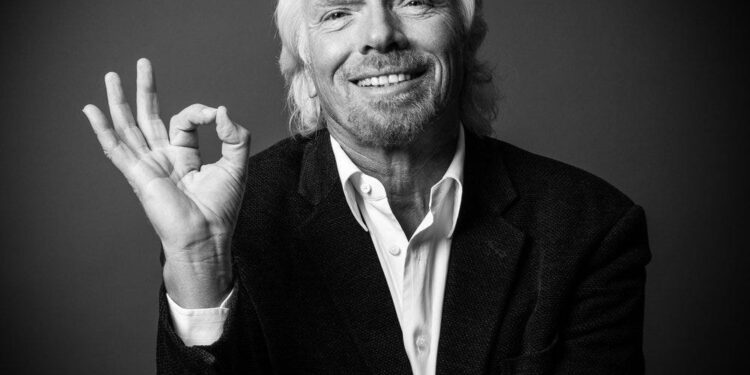Richard Branson is acutely aware of the hurdles that entrepreneurs encounter. He believes that one of the most effective ways to maintain motivation and embrace challenges is by surrounding oneself with uplifting individuals who back their endeavors.
Currently leading the Virgin group of companies, Branson was raised in a supportive setting. In his autobiography Losing
My Virginity, he shares how his parents—Eve, a former flight attendant, and Ted, a lawyer—and his father’s sister, Joyce, encouraged young Ricky to explore his ideas and assert his individuality.
For instance, at around 4 or 5 years old, Branson recalls how Aunt Joyce promised him 10 shillings if he could learn to swim during a family vacation that lasted two weeks. Though he struggled and couldn’t manage to swim in the ocean, he convinced his father to stop during the 12-hour drive back home so he could take one more attempt at a river. He hurriedly changed into his underwear and dashed into the water. “I quickly felt myself sinking, my legs thrashing ineffectively in the water. The current tossed me around, tugged at my underpants, and pulled me downstream. I gasped for air and swallowed some water…Then my foot struck a stone, and I pushed upwards with all my might.” After surfacing, he relaxed and began to kick slowly. “I could swim.”
Aunt Joyce commended him with a cheerful “well done” and handed him a 10-shilling note. It was then that Branson realized his father was soaking wet. “He had lost his nerve and jumped in after me. He gave me a huge hug. I cannot recall a moment in my life when I haven’t felt my family’s love.”
The vibrant Branson family also fueled his entrepreneurial ambitions. To boost family finances, Ted Branson crafted wooden tissue boxes and wastebaskets in his spare time, while Eve decorated and sold them. Meanwhile, her sister Clare worked to save Welsh mountain sheep from extinction. Aunt Clare expanded her efforts by selling pottery adorned with black sheep and getting village women to knit shawls and sweaters from her black wool. The Black Sheep brand became a significant success for her over many years.
These early entrepreneurial lessons left a lasting influence on young Richard. In his teenage years, he and his close friend Nik Powell tried to grow Christmas trees, only to find that rabbits devoured the young plants. Not discouraged, Branson shifted gears and decided to raise budgerigars. His father, albeit reluctantly, constructed a large aviary, and the birds bred prolifically. “Even after everyone in Shamley Green [his hometown] bought at least two, we were still left with an aviary full of them.” Tired of cleaning the aviary while her son attended boarding school, his mother “accidentally” let them loose.
Branson’s family continued to support him in his various ventures. At 17, he launched Student, a magazine aimed at youths. His family chipped in: His mother lent him 100 pounds to cover expenses, and she, alongside his dad and sister Lindi, sold magazines.
At the same time, Branson had another business idea. Given that everyone he knew was a music lover, he began to sell records at a discounted rate through mail order in 1970. While brainstorming for a name, one of his staff members at Student suggested Virgin, saying, “because we’re complete virgins at business.” Branson recognized that the name had great potential: it was striking and resonated with more than just students.
In January 1971, Virgin faced a major setback due to a postal strike. Branson’s friend Powell, who was managing finances for Student and Virgin, decided they needed to open a physical store to sell records. Branson inspired the owner of a vacant shop upstairs to allow them to use it free of charge since it would bring customers to his shoe store below. Powell and Branson worked hard to create a welcoming atmosphere, complete with free coffee and listening stations. Encouraged by the expanding customer base, Branson had another brilliant idea: a recording studio. He financed this venture with contributions from his parents, a bank loan, and a gift from Auntie Joyce.
Through his Virgin enterprises, Branson fosters a nurturing environment designed to draw out the best in entrepreneurs looking to pitch their concepts. In his personal life, he and his wife of two decades, Joan, have motivated their children, Holly and Sam, to chase their own dreams and to think big.
“All young people… require someone to illuminate a future for them. They need to decipher what they can do with their lives, how to enjoy life, how to sustain it, and how to accept accountability for their actions,” he states in his book Business Stripped Bare. “It’s regrettable that we educate children on nearly every aspect of the world but neglect to teach them how to participate in it, how to turn an idea into reality, how to gauge the impact of their actions, how to endure setbacks, or how to share their achievements.”


